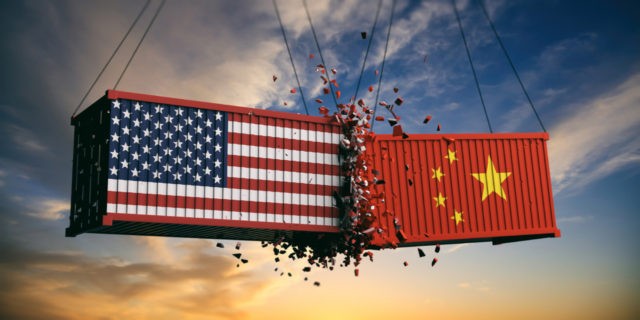The Wall Street Journal reported this weekend that far from the dire consequences predicted, the U.S. economy “sailed through two turbulent years of trade war with China with barely a scratch.”
The Wall Street Journal:
Farmers took a big hit. Importers of auto parts, furniture and machinery choked down punishing tariffs. Investment between the world’s two largest economies dropped.
Much of the U.S. economy is largely unscathed by two turbulent years of trade war with China, economic indicators show.
The biggest hit to the U.S. economy was a decline in agricultural exports to China. But this was largely ameliorated by the Trump administration’s decision to divert $28 billion of income from tariffs to U.S. farmers.
Perhaps most notably, tariffs did not cause prices to rise. According to the Journal, a basket of goods covered by U.S. tariffs showed prices rising 3 percent. But these were offset by prices falling on other goods. Inflation overall was near or below the Fed’s target of 2 percent, indicating that the trade war did not hurt U.S. consumers.
So who paid for tariffs? For the most part, it appears they were paid out of corporate profits of U.S. importers. Those corporations, of course, got a huge tax cut before the trade war kicked in, which means after-tax income was higher than it would have been.
Research by Alberto Cavallo, a professor at Harvard University and leading expert on inflation, showed the prices paid by importers for goods with tariffs jumped, meaning Chinese exporters didn’t cut their prices or absorb tariffs through currency depreciation.
“The burden has mostly fallen on the U.S. importers because a) Chinese exporters have not reduced their U.S. dollar border prices, and b) U.S. importers/retailers have chosen not to pass on to the U.S. consumers most of the additional cost,” said Mr. Cavallo, who co-wrote a paper on the economic impact of the tariffs with the chief economist of the International Monetary Fund, as well as economists at the Boston Federal Reserve and the University of Chicago.
There likely was a cost to the U.S. economy from the trade war. China’s economic slowdown reduced imports from Europe, which in turn reduced European demand for U.S. goods and services. Investment in the U.S., both domestic and foreign, slowed, perhaps because the on-again-off-again aspects of the trade war created enough uncertainty that some businesses decided to wait to see what the rules would be before buying equipment or expanding their facilities.
The main takeaway, however, is remarkable: the U.S. fought a trade war with its largest trading partner and emerged largely unscathed. The U.S. economy is far more resilient and less reliant on China than Trump critics believed.

COMMENTS
Please let us know if you're having issues with commenting.